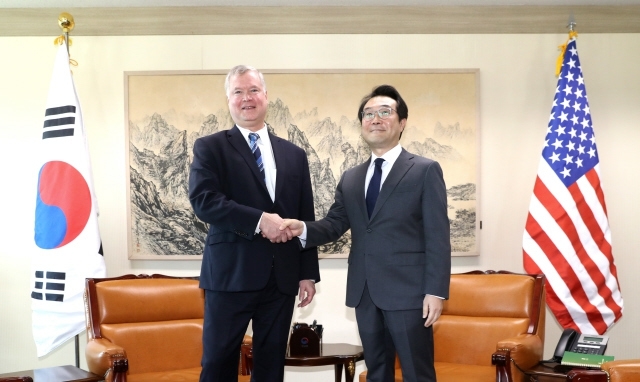Posted on : Dec.19,2018 16:20 KST
 |
|
The South Korea-US working group is led by Lee Do-hoon (right), special representative for Korean Peninsula peace and security affairs, and Stephen Biegun, US State Department special representative for North Korea policy. (photo pool)
|
The South Korea-US working group will hold its second meeting in Seoul on Dec. 21. This meeting is receiving quite a bit of attention, since it’s being held while the North Korea-US denuclearization negotiations are at a complete impasse. The meeting is supposed to address granting the groundbreaking ceremony for connecting the South and North Korean railroad networks an exemption from sanctions. Since South Korea and the US have no major disagreements on this matter, the question of granting an exemption from sanctions is expected to be resolved smoothly.
But there’s a bigger reason that attention is amassing around the working group’s meeting: the North Korea-US denuclearization negotiations, which remain deadlocked. For several months now, North Korea and the US have been unable to make progress in their negotiations. At the same time, the US has toughened its sanctions against North Korea and continued to raise the issue of human rights in the North.
On Dec. 14, US President Donald Trump obliquely pushed North Korea to make the first move by saying that the US would not rush its negotiations with the North. North Korea expressed its discontent with unusual sharpness on Dec. 16, noting that if the US tried to force it to give up its nuclear weapons, the path to denuclearization might be blocked forever. North Korea and the US appear to be locked in a battle of nerves, with each side counting on the other to blink first.
Of course, we shouldn’t assume that the trust that has formed between North Korea and the US has already eroded. But if such incoherent bickering continues, the denuclearization talks could run out of steam. That could cause yet another delay in the second North Korea-US summit, which is currently supposed to happen in January or February 2019. Furthermore, as long as this deadlock continues, the US won’t ease its sanctions on North Korea, which will frustrate the South Korean government’s efforts to improve inter-Korean relations and initiate economic cooperation.
As long as North Korea and the US are relying on a strategy of waiting as they grapple with each other, it’s even more necessary for the South Korean government, in its role as both facilitator and guide, to devise and present a compromise proposal for denuclearization and corresponding measures that would be acceptable to both North Korea and the US. For starters, that should be discussed in detail during the upcoming meeting of the South Korea-US working group. To be sure, no major decisions are likely to emerge from the working-level meeting.
That said, the meeting can’t produce a breakthrough if it doesn’t go beyond business as usual. North Korea-US dialogue needs to resume before the end of this year if the momentum of the denuclearization talks is to be sustained and if the second North Korea-US summit is to be pulled off without any trouble early next year. If things don’t go smoothly, Seoul could also consider the option of sending high-level officials as envoys to North Korea and the US. This is the time to make a heroic effort to break out of this deadlock.
Please direct comments or questions to [english@hani.co.kr]






